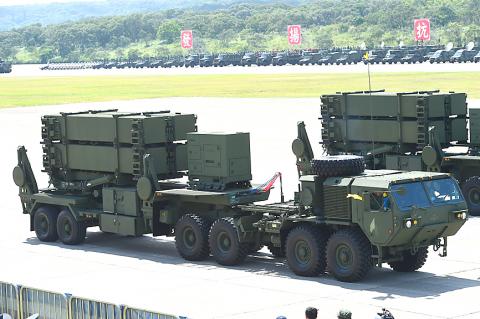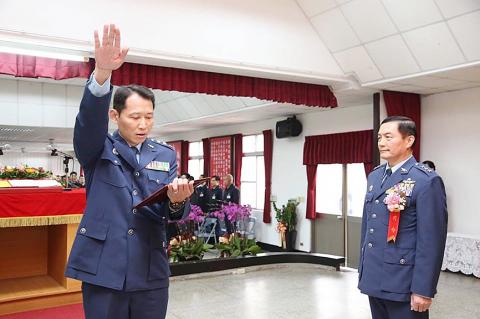The Ministry of National Defense said Patriot Advanced Capability-3 (PAC-3) missile batteries have been deployed on the east coast in response to an increased Chinese military presence in the area.
To improve integrated air defense capabilities, the ministry has deployed missiles to Hualien and Taitung counties, and merged the Air Defense Missile Command with the air force to streamline the chain of command, a ministry report submitted to the Legislative Yuan said.
The reorganization and relocation was ordered after the Chinese People’s Liberation Army (PLA) conducted several long-distance naval and aviation training missions — featuring an aircraft carrier and fleets of nuclear-capable bombers — in the East China Sea, South China Sea, East Indian Ocean and western Pacific Ocean to demonstrate its long-range power projection capabilities and Beijing’s ambition to dominate the Asia-Pacific region.

Photo: Chang Chia-ming, Taipei Times
Annual military exercises would test the effectiveness of the deployments, the ministry said.
It is the first time the ministry has confirmed the deployments, after speculation emerged following the publication of photographs last month showing missiles in the military’s air defense bases in eastern Taiwan.
The report also announced a doctrinal shift from “effective deterrence” to “multiple deterrence.”

Photo: Military News Agency
The ministry said that it would develop the defense industry to ensure self-sufficiency and national security.
A quadrennial defense review, along with three defense plans that are expected to be the guidelines for the nation’s military buildup, are to be submitted to the Legislative Yuan by March 19.
The military is to conduct new exercises, including integrated air-and-sea training, rescue missions, fishing boat escort missions and supply missions in response to the PLA’s actions.
In addition to field exercises, computer-aided simulations are to be part of regular armed forces exercises.
A tactical engagement simulation system has been built for the army, and the ministry is exploring creating new simulation systems using virtual and augmented-reality technologies.
Measures have been taken to improve the military’s digital warfare capabilities this year, with Academia Sinica and the National Chungshan Institute of Science and Technology forming partnerships with the military, the ministry added.
The Air Defense Missile Command was yesterday merged with the air force at a handover ceremony at the command’s Taishan District (泰山) headquarters in New Taipei City.
The command, to be headed by Colonel Yu Jen-ming (游仁明), is expected to merge with the Air Defense Artillery Command to improve operational efficiency.
“The missile command is a high-tech, combat-ready unit and it is one of the most important components of the integrated air defense system,” Air Force Commander General Shen Yi-ming (沈一鳴) said.
The merger would see the transfer of PAC-3, Tien Kung anti-ballistic missiles and Hawk anti-aircraft missiles, as well as tactical counterstrike missiles and Hsiung Feng 2E cruise missiles, to the air force.

MAKING WAVES: China’s maritime militia could become a nontraditional threat in war, clogging up shipping lanes to prevent US or Japanese intervention, a report said About 1,900 Chinese ships flying flags of convenience and fishing vessels that participated in China’s military exercises around Taiwan last month and in January have been listed for monitoring, Coast Guard Administration (CGA) Deputy Director-General Hsieh Ching-chin (謝慶欽) said yesterday. Following amendments to the Commercial Port Act (商港法) and the Law of Ships (船舶法) last month, the CGA can designate possible berthing areas or deny ports of call for vessels suspected of loitering around areas where undersea cables can be accessed, Oceans Affairs Council Minister Kuan Bi-ling (管碧玲) said. The list of suspected ships, originally 300, had risen to about 1,900 as

Japan’s strategic alliance with the US would collapse if Tokyo were to turn away from a conflict in Taiwan, Japanese Prime Minister Sanae Takaichi said yesterday, but distanced herself from previous comments that suggested a possible military response in such an event. Takaichi expressed her latest views on a nationally broadcast TV program late on Monday, where an opposition party leader criticized her for igniting tensions with China with the earlier remarks. Ties between Japan and China have sunk to the worst level in years after Takaichi said in November that a hypothetical Chinese attack on Taiwan could bring about a Japanese

Right-wing political scientist Laura Fernandez on Sunday won Costa Rica’s presidential election by a landslide, after promising to crack down on rising violence linked to the cocaine trade. Fernandez’s nearest rival, economist Alvaro Ramos, conceded defeat as results showed the ruling party far exceeding the threshold of 40 percent needed to avoid a runoff. With 94 percent of polling stations counted, the political heir of outgoing Costa Rican President Rodrigo Chaves had captured 48.3 percent of the vote compared with Ramos’ 33.4 percent, the Supreme Electoral Tribunal said. As soon as the first results were announced, members of Fernandez’s Sovereign People’s Party

MORE RESPONSIBILITY: Draftees would be expected to fight alongside professional soldiers, likely requiring the transformation of some training brigades into combat units The armed forces are to start incorporating new conscripts into combined arms brigades this year to enhance combat readiness, the Executive Yuan’s latest policy report said. The new policy would affect Taiwanese men entering the military for their compulsory service, which was extended to one year under reforms by then-president Tsai Ing-wen (蔡英文) in 2022. The conscripts would be trained to operate machine guns, uncrewed aerial vehicles, anti-tank guided missile launchers and Stinger air defense systems, the report said, adding that the basic training would be lengthened to eight weeks. After basic training, conscripts would be sorted into infantry battalions that would take